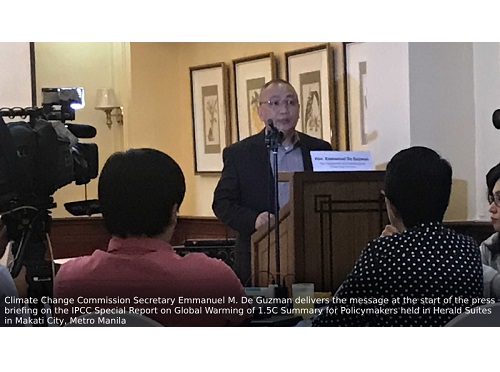
October 08, 2018 Monday

Manila, Philippines - The Climate Change Commission (CCC) urges for stricter and more efficient implementation of the Paris Agreement during its press briefing for policymakers and media on the Intergovernmental Panel on Climate Change (IPCC) Special Report on Global Warming of 1.5°C today.
“The Summary for Policymakers of the Special Report on Global Warming of 1.5 degrees Celsius of the Intergovernmental Panel on Climate Change (IPCC) affirms the Philippines’ call for greater urgency and ambition in implementing the Paris Agreement,” said CCC Vice Chairperson and Executive Director Emmanuel de Guzman on his welcoming remarks.
This briefing, held in partnership with the Institute for Climate and Sustainable Cities (ICSC) is the first of a series that the CCC will conduct to sustain a common understanding on the 1.5 science and goal, and to effectively align science, policy and action at all levels.
Through this briefing, de Guzman wishes to localize and provide a layperson’s viewpoint of the IPCC Special Report and employ massive public information, communication and education strategies so that Filipinos can adopt green lifestyles and respond to save vulnerable communities and the planet.
The Climate Vulnerable Forum (CVF) under Philippine chairmanship advocated strongly for the 1.5 climate ambition to define and drive the global climate action, as reflected in the Manila-Paris Declaration adopted in Manila and in Paris in November 2015, by more than 40 developing nations.
As this latest climate science informs national policy and global action, De Guzman emphasized that now is the time to uphold the integrity of our ecosystems, to protect local communities from the onslaught of extreme weather, and to secure sustainable food and water supply, and the health and safety of our homes and communities.
“There is no more eloquent moment than now to declare that climate action in the context of climate justice is a moral imperative and that all must now work together, as brothers and sisters of one humanity, to build a common home and a common future that lets all survive and thrive,” De Guzman added.

Rosa T. Perez, PhD, a member of the National Panel of Technical Experts (NPTE) of the Climate Change Commission and one of the Lead Authors of the IPCC Special Report, reiterated that “Climate change is already affecting people, ecosystems and livelihoods around world.” She continued that “clearly, half a degree matters, there are clear benefits in keeping warming at 1.5 degrees Celsius compared with 2 degrees Celsius or higher.”
In the context of sustainable development, Dr. Perez added “limiting to a 1.5 degree Celsius can go hand in hand in the achievement of other world goals such as the Agenda 2030 on Sustainable Development.” Limiting warming to a 1.5 degree Celsius is not impossible but very challenging as it requires “rapid and far-reaching” transition in land, energy, buildings, transport and cities.
On the economic implications of the Special Report, Professor Toby Monsod, PhD, of the University of the Philippines School of Economics, said that “getting to a 1.5 degree Celsius is still technically and economically feasible under a variety of social and economic assumptions providing action begins very soon.” She added “there will be trade-offs but these (trade-offs) are context-specific. We, as a country, need to build on this and do our homework.”
“Addressing climate change as a distinct objective is an opportunity to spur wider economic transformation. That climate change should not be paired with disaster risk reduction and management or subsumed under environmental sustainability, rather should be paired with development as a necessary condition to reduce poverty and achieve prosperity,” Professor Monsod added.
Commissioner Rachel Herrera of the Climate Change Commission committed to communicate and organize briefings with the members of the cabinet and with the key committees of both Houses of Congress in the coming weeks.
Said Special Report is the IPCC’s response to the governments’ appeal for the publication of a special report comprised of the impacts of global warming on natural and human systems, several climate change research, as well as the effects of global warming on sustainable development when they adopted the Paris Agreement in 2015.
With more than 6,000 scientific references cited worldwide, said report was prepared and furnished by ninety-one authors and review editors from 40 countries.